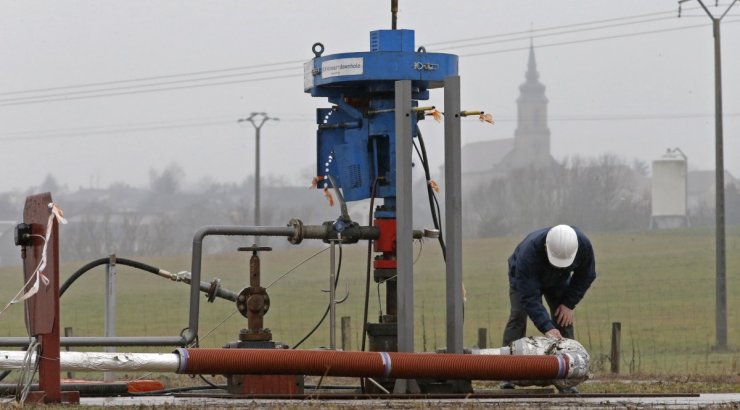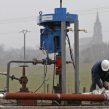
Public Interest and Shale Gas in Lithuania: Is Reconciliation Possible?
Publication: Eurasia Daily Monitor Volume: 11 Issue: 203
By:

Just prior to his mid-October 2014 visit to the United States, Lithuanian Prime Minister Algirdas Butkevicius revealed that his talks with the US government would devote special attention to energy issues, including trying to invite US companies to take part in a new shale gas exploration tender to be announced in the near future (lrt.lt, October 6). Lithuania’s consistent progress in adjusting its legislation and simplifying tender conditions (lrt.lt, accessed November 12), as well as its determination to avoid mistakes with new investors, testify to the Lithuanian government having drawn important lessons after the failure of its first tender, when Chevron pulled out of the country in 2013 (see EDM, November 20, 2013). However, it is unclear how the government will deal with continued domestic opposition toward shale gas. What are the reasons for this unfavorable public opinion, and can it be reconciled?
Shale gas extraction in Lithuania should increase the country’s energy independence from Russia and reduce gas costs—both strategic goals that are presumably in the public interest. And yet, the US company Chevron’s withdrawal from the shale gas extraction process in Lithuania caused no public concern, even though this development directly affected Lithuania’s energy security prospects. In fact, public interest in energy security issues is informed not only by objective risk parameters, but also by the perception of energy policy and its related risks (i.e., subjective evaluation). And like in any modern society, Lithuanians are divided into various socio-demographic groups that perceive both energy security and the public interest in differing ways.
Indeed, the data obtained from the public survey “Public Attitude Towards Energy Security,” organized by Vytautas Magnus University (VMU) scholars of the Energy Security Research Centre in spring 2013, showed that, according to public opinion, “the development of shale gas extraction” is the least significant aspect of achieving Lithuanian energy security. Just 39.7 percent thought that shale gas extraction is a significant or very significant solution to Lithuania’s energy insecurity, while 28.6 percent of respondents believed that it is insignificant or not significant at all. And nearly one third (31.7 percent) were undecided on this issue. Among the 14 energy-related issues that respondents were asked to evaluate, “the prices of energy resources” and the “reliability of the provision of energy services” were named as the most important to Lithuanian energy security—with 89.7 percent believing each to be important or very important (Augutis, J., Krikstolaitis, R., Genys, D., Peciulyte, S., Cesnakas, G. [eds], Lithuanian Energy Security, Annual Review 2012–2013, Kaunas: Vytautas Magnus University, 2014).
Furthermore, the data from the same survey shows that just 36.5 percent of respondents claimed that the “interests of farmers/private landowners should not restrict the development of energy resources.” Whereas, 62.7 percent said that energy resource extraction “should not harm the interests of farmers/private landowners.” As many as 85.8 percent of respondents agreed with the statement that “Priority should be given to environmental protection despite the fact that this limits shale gas extraction,” and only 13.0 percent agreed that “Priority should be given to shale gas extraction despite the fact that this might have a negative impact on the environment.”
These public preferences reveal two things: first, the majority of Lithuanian society still does not think that shale gas extraction represents a major answer to ensuring the country’s energy security, and nor do they consider shale gas to be directly related to the public interest. Second, a large part of the Lithuanian society is in favor of farmers’ and landowners’ (environmental) interests over the interests of energy companies. This is why Chevron’s departure not only failed to raise any public concern, but was even greeted with joy by some elements of society.
Interestingly this public survey was conducted again in spring 2014, and the results show that even events in Ukraine and the increased risk to Lithuania posed by Russia’s unpredictable, aggressive behavior had virtually no significant impact on the public’s opinion regarding the shale gas exploration issue. According to the results, 36.6 percent of respondents fully agreed/agreed with the statement “I believe that shale gas extraction will increase Lithuanian energy security,” 27.7 percent strongly disagreed/disagreed, and 35.7 percent were undecided (Augutis et al. [eds.], 2014).
The problem for the government, which wants to pursue shale gas exploration, extends further—to society’s distrust toward the authorities. Bearing in mind that 47.1 percent of Lithuanians consider the country’s politicians to be doing a “bad” or “very bad” job, and 47.9 percent equally poorly rate Lithuanian civil servants, it does not seem surprising that the government’s energy policies are faced with such unfavorable public discourse (Augutis et al. [eds.], 2014, p. 21).
Another difficulty for Vilnius is that the government does not seem to recognize (or at least does not treat seriously) this public hostility. And instead of trying to change the population’s thinking, the government prefers to try to force its policies through. However, a stream of reliable, positive information from the government is needed to educate Lithuanians and counter the negative discourse that dominates the energy security debate in the country today.
Perhaps the biggest challenge awaiting both the Lithuanian leadership and the future shale gas tender winner is to recognize the motives of those parts of society negatively predisposed toward or still undecided about developing shale gas. Policymakers and corporate PR departments, therefore, will need to develop a successful information campaign to prove (by giving tangible evidence) that shale gas extraction can be compatible with the interests of farmers and private landowners, show that the impact on the environment will be negligible, and highlight shale gas’s benefits to Lithuanian society. By increasing positive and constructive knowledge regarding shale gas, as well as convincing voters of the authorities’ and energy companies’ competency and abilities to ensure safe energy extraction practices, the government may be able to overcome the population’s hostility toward a much needed element of Lithuania’s energy security strategy. This will not be easy to achieve, but in the current uncertain environment, they are potentially more important than ever.




